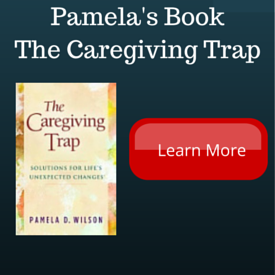Alzheimer’s Disease: in Memoriam Marriage
By Pamela D. Wilson, CSA, MS, BS/BA, CG
 “In sickness and in health, until death do us part;” words recited at marriage ceremonies with the expectation of a life-long happy marriage and a golden retirement. Years pass with children, career, moving here, and there. One day a surprising and unwelcome visitor, Alzheimer’s disease, shows up at the front door. A few more years pass and we find ourselves living with a spouse who has no recollection that we were once a young, active, married couple looking forward to a long and happy life together. Our spouse has becomes a person, much like a child, for whom we provide care.
“In sickness and in health, until death do us part;” words recited at marriage ceremonies with the expectation of a life-long happy marriage and a golden retirement. Years pass with children, career, moving here, and there. One day a surprising and unwelcome visitor, Alzheimer’s disease, shows up at the front door. A few more years pass and we find ourselves living with a spouse who has no recollection that we were once a young, active, married couple looking forward to a long and happy life together. Our spouse has becomes a person, much like a child, for whom we provide care.
We wake in the morning to toilet, dress, and make breakfast for a husband or wife who on some days requires spoon feeding. The day passes. We stay home for fear of leaving our loved one alone. Maybe a friend visits for a few hours so that we might take a break to run errands and go to the grocery store. Each night, the glowing hand of the clock sitting on the nightstand moves ever so slowly as we listen for our loved one to get up out of bed or we discover damp sheets that require changing. Sleep is illusive. Worry, stress, and overwhelm our new constant companions.
What happens when a spouse admits that he or she can no longer care for a spouse with Alzheimer’s disease? Blame, guilt, and shame from family, children, friends, and acquaintances is freely offered, “I would never put my husband (or wife) in a home—what are you thinking?” “He (or she) would never do that to you.”
Until one walks in the shoes of a caregiver for a loved one with Alzheimer’s it is impossible to understand the day to day joys, pressures, and struggles. It is easy to judge and to be critical of situations when looking in from the outside. Being a caregiver is often a lonely journey. Friends are lost, social activities are sacrificed to care for a loved one, going out of the home takes monumental effort and coordination with the requirement of having someone else come and stay with a loved one so that the caregiver might steal a few hours of precious time. The caregiver and the care receiver become prisoners in their own home, opposite of the life imagined by many in retirement.
What happens when the person you married no longer recognizes you or believes you to be a friend whose name cannot be remembered? Is the marriage still a real marriage? Should the healthy spouse dedicate their life to caregiving and sacrifice what most would consider a normal life of friends, activities, and companionship?
What if the healthy spouse finds a companion outside of the marriage—is that cheating? What if the Alzheimer’s spouse finds a companion in a care community—is that cheating? Many individuals fail to consider the realities of the isolation involved in care relationships created by Alzheimer’s disease that changes the dynamic of a marriage.
Many spouses honor the commitment of “until death do us part” but acknowledge that a life of isolation is unfair and impractical. Many spouses who pursue love relationships outside of marriage remain committed to caring for their Alzheimer’s spouse living in a community. The healthy spouse visits to ensure that their husband or wife is receiving beneficial care.
These spouses ask me if having a relationship outside of marriage is okay. My response is that the person they married no longer exists and that they as the caregiver have the right to enjoy life in whatever manner determined to be appropriate. I ask them how they would feel if their Alzheimer’s spouse found love in the care community. Some hesitate to respond never considering this to be a possibility; others understand the human need for companionship and love and respond that this would be okay.
At the time one’s world changes to encompass a small environment like a memory care community, it is very likely that a person will find a companion of the same or different sex. This does not mean the relationship is always sexual in nature. Sexual expression in care communities is a complicated subject.
Adult children become upset when a parent finds a companion. Husbands or wives visit and find their spouse sitting on the couch holding hands with a companion of the opposite sex. Care staff is held accountable by family members for the actions of residents or may be embarrassed when they walk into a room where a couple may be expressing themselves sexually. Sexual expression that once occurred in the privacy of a home now occurs in the open areas of memory care communities.
Spouses who agreed to be faithful until the end find love and life again outside of the memory care communities where their spouse resides. Who is to say if this is cheating? Just as beauty is in the eye of the beholder, compassion should be in the hearts of family, children, and friends to support caregivers when the unwelcome visitor of Alzheimer’s arrives and tosses life upside down. It is impossible to imagine the journey of caregiving and unfair to expect a caregiver to live a life of isolation.


